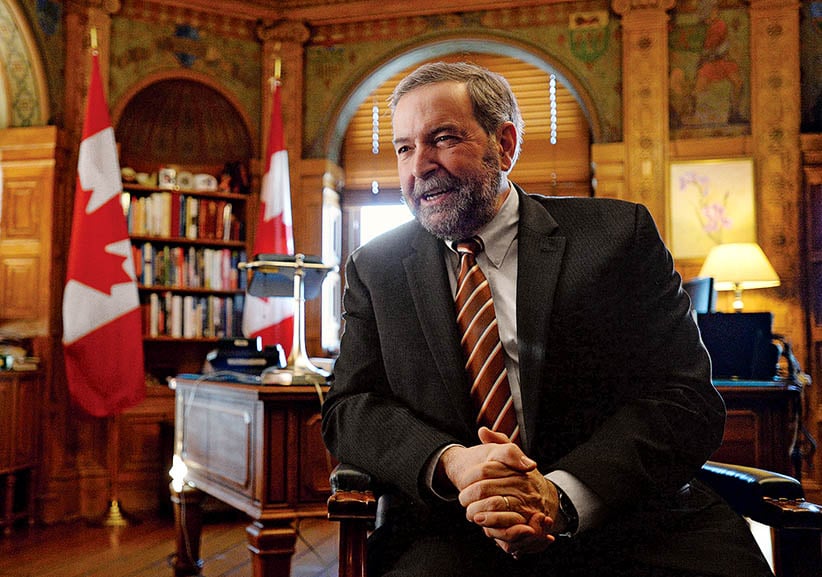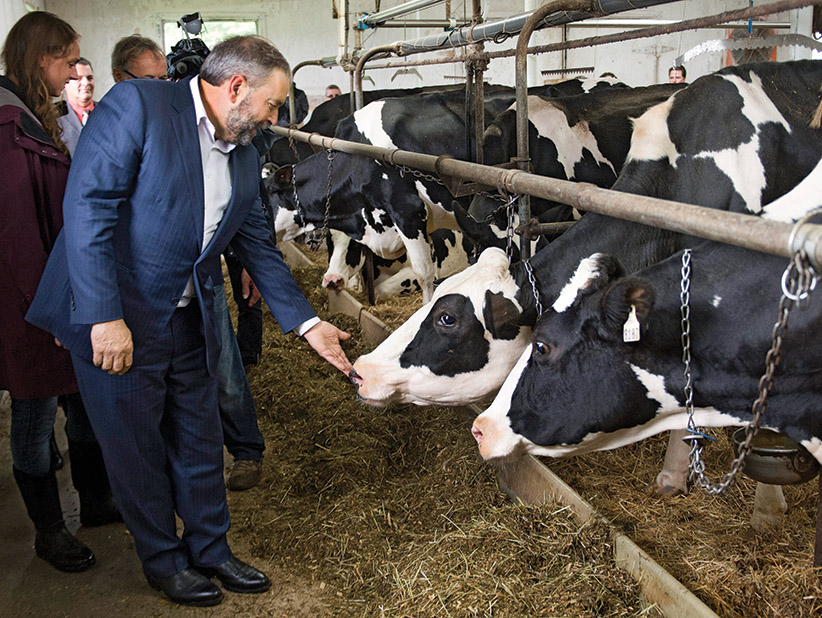Thomas Mulcair: How he’s ready to spar in 2016
Tom Mulcair’s back, taking on the new PM, fighting for good-paying jobs—and addressing his own future
NDP Leader Thomas Mulcair takes part in an interview in his office on Parliament Hill in Ottawa on Friday, January 16, 2015. (Sean Kilpatrick/CP)
Share

The cruel truth for Tom Mulcair is that his NDP started the election campaign of 2015 leading in many polls and ended up, when the votes were counted on Oct. 19, in third place. As a tough year drew to a close, Mulcair spoke with Maclean’s Ottawa Bureau Chief John Geddes. Excerpts of that interview follow.
Q: There are early question marks surrounding the Trudeau government on issues like how quickly they are bringing refugees to Canada and what sort of deficit they might post next year. But there’s also an atmosphere of uplift and hopefulness, which I’m guessing you, and others on the progressive side of the spectrum, wouldn’t want to lean too hard against.
A: Don’t forget: a change of tone has to be followed by a change of substance. I was in Paris [for the UN conference on climate change]. I did find it a little bit boastful to say “Canada is back,” equating the return of the Liberals with the return of Canada, but I did note there was a much more hopeful tone, a much more helpful tone, and I encourage that. I was very hopeful that that change of tone would translate into something. But then we started getting “Give us a few months, we’re going to talk to the provinces.”
The only thing that will matter in 2016 is, did Canada produce fewer greenhouse gases than we did in 2015? In 2017, will we produce fewer still again? We’ve seen nothing to lead Canadians to believe that. I’m hopeful, but I haven’t seen anything yet that gives me confidence that this is going to happen.
Q: One decision the new Liberal government must make quickly is on whether or not to sign the Trans-Pacific Partnership trade deal. Do you think it’s possible for Canada to sign, but still protect the things you’re worried about?
A: Don’t forget, there was a huge promise of compensation, a massive compensation promise of over $4 billion for the loss of the supply management side in the dairy sector. There’s been no clear promise if the Liberals are going to follow through on that.
Q:You’re referring to a Conservative promise.
A: Yeah, but there’s no clear indication that that promise is going to be respected [by the Liberal government]. People who’ve had dairy farms in their family for generations are now saying, “Hold on, what does that mean for us?” When we talk to our colleagues in the labour sector, they’re very concerned about tens of thousands of good-paying jobs that would be lost in auto parts. Those are jobs we have to hold onto. We’ve lost 400,000 good-paying manufacturing jobs under Stephen Harper’s watch. That’s got to stop.

Q: Isn’t it possible the concerns of the auto parts sector could be eased by some form of federal support, even if the government signs onto TPP?
A: Right, but the problem is those promises are often not kept, and the problem is long-term. Where is Canada going to be? If we don’t have a government that champions good-paying manufacturing jobs, we’re going to continue to live in the Harperite world of low-paid, precarious, part-time work, which is the new Canada.
Related: Interim Tory leader Rona Ambrose’s year-end interview with Maclean’s
Q: More than for most federal politicians, your image rests on your effectiveness in question period. But that was a style that you honed against Harper. How might you might adjust for Trudeau?
A: We are adjusting, and we’re doing it by asking very specific questions. Mr. Trudeau stood beside Mayor Denis Coderre in Montreal at city hall, to use one example, and he said, with no ifs, ands or buts, he would be restoring home mail delivery. That was a clear, rock-hard promise, and he’s starting to back away from it. All you have [to do is] read the quote, and then ask, “Did you say that?” I asked him that the other day. When Mr. Trudeau started doing the back crawl, Canadians had all the information they needed. There have been a lot of promises like that.
You talk about the refugees. During the election campaign, before we made our commitment in the NDP to bringing in 10,000 before the end of the year, we talked to the experts. We talked to the top academics. We looked at what the United Nations was asking of Canada. We talked to NGOs. They all said it’s extremely ambitious, but 10,000 is plausible between now and the end of the year. The next day the Liberals held a press conference to attack us. “What a bunch of chisellers. Ten thousand? We can do 25,000 by the end of the year!” Barely a couple of days after the [Trudeau government’s] swearing-in, they said, “Oh, by the way, 25,000 is totally unrealistic, maybe 10,000.” Lo and behold, that’s exactly what we had said. That part can be a bit frustrating. But we have to get back to the good part, which is we’re very happy that Canada is playing a role in receiving Syrian refugees, something that Stephen Harper had been abysmal at.
Q: You’ve been asked about your future. Are you determined to stay on as NDP leader? If you are, have there been moments you wavered?
A: There are moments, when I’m talking to a defeated colleague who I would still love to have standing shoulder-to-shoulder with me in the House. I feel that weight. I know I’m the only person responsible. The short answer to your first question is, since the day of the election, despite my sadness at the result, knowing that we came up short—you know what?—we’re the New Democratic Party and it’s up to the members. I continue to work hard and tirelessly across Canada.